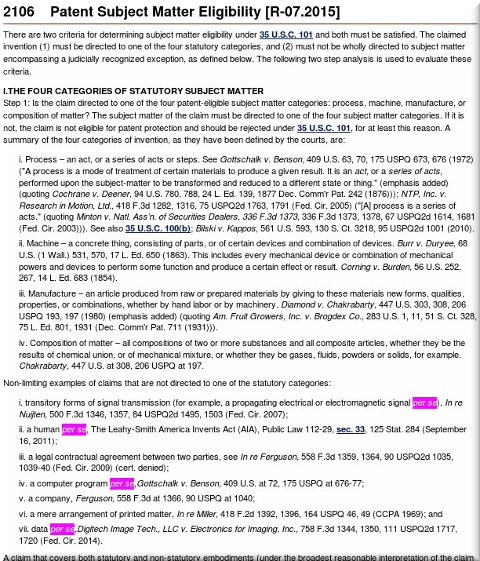

THE United States' Supreme Court was pretty clear about abstract patents and the USPTO very begrudgingly took this into account, only after courts have time after time thrown in the wastebasket patents granted by the USPTO, where quality control is worse than black comedy (is any examination being done at all or just stamping for a fee?).
"Unsurprisingly, in this extremely unregulated system, the patent office does the very minimum to realign as per court rulings and it leaves many loopholes for patenting of abstract software ideas."Based on this page about "Patent Subject Matter Eligibility", the USPTO does not want to actually obey the law as interpreted by the Supreme Court. Unsurprisingly, in this extremely unregulated system, the patent office does the very minimum to realign as per court rulings and it leaves many loopholes for patenting of abstract software ideas. The term "per se" is mentioned at least 5 times in this page and Benjamin Henrion (FFII) rightly said that the "USPTO is abusing the "per se", as the EPO has abused "as such" to render software patentable at the end" (these words are like vague exceptions to each rule).
"Patents," wrote a patents-centric person, "New entrant in ۤ 101 (subject matter eligibility) tome. When do they update MPEP?"
Henrion, who will speak about similar issues pertaining to software patents in Europe tomorrow in Brussels, responded to the above by saying "that's written by legalese guys that want to exploit loopholes."
“USPTO is abusing the "per se", as the EPO has abused "as such" to render software patentable at the end”
--Benjamin HenrionAnother person who opposes software patents wrote: "Interpreting the Law to serve themselves? In order to obtain fees?"
Henrion later called it "EPO style power money grab" (recall how the EPO does this).
They are rendering software patents "acceptable" (or implicitly allowed) so as to grab more power and money at at the expense of citizens. This is just wrong. It shouldn't be done. These organisations have .org and .gov domains, but they operate like greedy corporations and serve the greediest corporations, not citizens.
Writing about the Court of Appeals for the Federal Circuit (CAFC), this pro-software patents site (of patent lawyers) wrote yesterday that CAFC "Did Not Abuse Its Discretion To Allow Defendant’s €§ 101 Defense After Alice; Claims for “Anonymous Load Shopping” Using Generic Computer Technology Are Abstract And Unpatentable."
It also said that "the plaintiff moved to strike the re-asserted invalidity defense under €§101 as not made with good cause and as unfairly prejudicial. The defendant argued that the change was made in view of the Supreme Court’s €§101 decision in Alice v. CLS Bank, which was decided two months before the final invalidity contentions were served. The district court agreed that the Alice decision was sufficient cause to re-assert the €§101 defense in the final invalidity contentions. The district court later granted summary judgment of invalidity under €§101. The plaintiff appealed."
As can be seen here, the USPTO grants patents on software, but as per Supreme Court rulings, these patents are ruled invalid. This means that the USPTO no longer does what's lawful and the wordings above ("per se") help show that it's not even interested in obeying the law. It just wants to exponentially grow the number of granted patents (the number doubled in a matter of a few years!).
This extreme greed means that a patent bubble is being created (leading to incorrect valuations of some companies) and it will inevitably explode/burst, causing a lot of damage to the US economy. It wouldn't be so bad for patent lawyers when it finally happened.
Australian patent lawyers, in the meantime, try to figure out how to patent software in the US and in Australia. Lawyers' media has just published "Business Method and Software Patent Eligibility: Australian and U.S. Standards" and it says:
RPL held that “[i]t is not a patentable invention simply to ‘put’ a business method ‘into’ a computer to implement the business method using the computer for its well-known and understood functions.” Stated another way, the computer cannot be “a mere tool in which the invention is performed,” but rather “must involve the creation of an artificial state of affairs where the computer is integral to the invention . . . .” The inventive aspect (“ingenuity” as termed by the Australian court) must be “in the way in which the computer is utilised,” not in the scheme, plan, or process that is being implemented.
At first blush, this sounds similar to the guide posts present in the U.S. Supreme Court’s decision in Alice Corp. v. CLS Bank Int’l. The Supreme Court held that “a mere instruction to ‘implement’ an abstract idea ‘on a computer’ . . . cannot impart patent eligibility.” Instead, citing prior cases, Alice held that the invention may be patent eligible where it “improve[s] the functioning of the computer itself,” or “effect[s] an improvement in any other technology or technical field.”
--Marshall Phelps, Microsoft